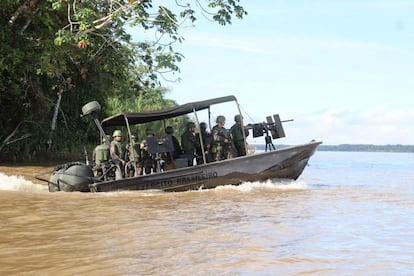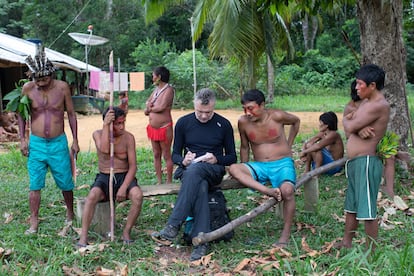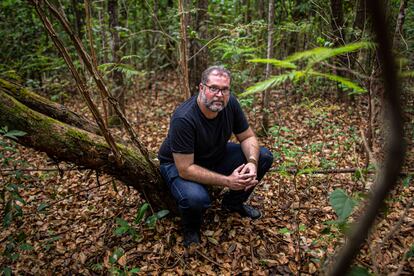Brazil searches for British journalist and indigenous advocate missing in the Amazon
A fisherman has been detained after his boat was seen chasing Dom Phillips and Bruno Pereira on Sunday as they approached their destination


Brazilian authorities have deployed search teams to the stretch of river where British journalist Dom Phillips, a contributor to The Guardian newspaper, and Bruno Pereira, an advocate for indigenous rights, went missing on June 5 in a territory known as Vale do Javari (Javari Valley). It is a remote area of the Brazilian Amazon that borders Colombia and Peru, and the location of the largest concentration of uncontacted indigenous tribes in the world. The search party included local people, two boats, a Navy jet ski, divers, and police and soldiers trained in jungle navigation. Signs that the two men may have been ambushed have worried their families and colleagues.
A fisherman has been detained and is in the custody of the Brazilian Military Police. The suspect was arrested after his boat was seen chasing both men on Sunday as they approached their destination, the city of Atalaia do Norte. According to witnesses, there were several men aboard a second boat whom the police are now looking for. Meanwhile, a judge has ordered the government of Jair Bolsonaro to intensify search and rescue operations.
According to the Brazilian newspaper O Glovo, which did not cite any sources, a few days ago Pereira went to the Federal Police and the public prosecution with detailed information about several individuals who allegedly formed a criminal organization involved in illegal hunting and fishing. The men he singled out are the same ones the police are now looking for.
Phillips and Pereira disappeared while returning from a guard post manned by indigenous people in a remote part of the jungle where Phillips was interviewing locals under constant pressure from poachers, fishermen, loggers and drug traffickers. The tribes say that the Brazilian government’s neglect has forced them to defend their ancestral lands alone.
The police have opened a criminal investigation and are working under the assumption that the two men were attacked. However, the police officer in charge of the investigation told a Reuters reporter that they have not ruled out the possibility that the two men simply got lost. Four local fishermen have been questioned.
Pereira was employed for many years by FUNAI (Fundação Nacional do Índio or National Indian Foundation), the government agency responsible for protecting the country’s indigenous peoples, and has been repeatedly threatened in the past. Relatives of Phillips and Pereira, along with several non-profit groups, have urged Brazilian authorities to expand the search operation. “Even if I don’t find the love of my life alive, they have to be found, please. Please intensify the search,” said Phillips’ wife, Alessandra Sampaio, in a tearful plea on social media. Pereira’s partner, Beatriz Matos, said that “every minute counts. Any part of the river or jungle that has not been searched could be the place where they are waiting to be rescued.”
About 25 indigenous experts in jungle searches have been deployed to the area, even as activists accuse the Brazilian government “of neglecting its responsibilities in the face of escalating violence.” UNIVAJA, an association of nine indigenous groups of the Javari Valley, the Observatory of Isolated Peoples (OPI), and APIB, a coordinating organization of indigenous peoples, have asked authorities to widen the search using helicopters, more people and boats.
“Two people on a boat trip in a completely wild area like this– it’s an adventure that’s not at all advisable. Anything can happen. They could have had an accident or been murdered. Let’s pray to God that they are found soon,” said President Jair Bolsonaro with his customary bluntness. Although the president portrayed them as rash adventurers, both are skilled professionals with decades of experience.

Phillips and Pereira were last seen navigating down the Itaqui River to the town of Atalaia do Norte. The men and their boat were last seen on June 5. In an EL PAÍS article published in May 2022, Pereira said he was an experienced explorer accustomed to living in the jungle for weeks at a time.
A statement issued by Brazil’s Foreign Ministry said, “If their disappearance was the work of criminals, we will do everything possible to bring the perpetrators to justice.”
Pereira had been getting threats for some time, including death threats. During this latest expedition, the two men encountered armed men who had menaced the indigenous guards they had just interviewed. Phillips photographed the armed men from a distance, according to the head of UNIVAJA.
Phillips is writing a book on the environment and Pereira is on unpaid leave from FUNAI. Pereira remains fully dedicated to protecting the tribes of the Javari Valley, a region the size of Austria under constant encroachment by outsiders. Those who live and work in the valley defending the local populations and the environment feel increasingly abandoned and vulnerable to the criminals that plunder the jungle and traffic drugs with impunity.

Brazil has many lawless regions, and when Jair Bolsonaro took office, he actively promoted a narrative that accuses indigenous people and non-profits of hindering economic development. UNIVAJA, OPI and APIB released a joint statement that condemned “the repression of journalism and the impunity enjoyed by those who threaten officials committed to defending the Constitution.” They evoked the 2019 murder of a FUNAI employee in a nearby town, and reported that the FUNAI surveillance post has been recently attacked eight times by armed men.
On June 6, criticism about the slow deployment of vehicles and people to the search area erupted into outrage on social media when the regional military detachment stated that it was fully capable of conducting the mission, but would only do so “when ordered by superior officers.”
Tu suscripción se está usando en otro dispositivo
¿Quieres añadir otro usuario a tu suscripción?
Si continúas leyendo en este dispositivo, no se podrá leer en el otro.
FlechaTu suscripción se está usando en otro dispositivo y solo puedes acceder a EL PAÍS desde un dispositivo a la vez.
Si quieres compartir tu cuenta, cambia tu suscripción a la modalidad Premium, así podrás añadir otro usuario. Cada uno accederá con su propia cuenta de email, lo que os permitirá personalizar vuestra experiencia en EL PAÍS.
¿Tienes una suscripción de empresa? Accede aquí para contratar más cuentas.
En el caso de no saber quién está usando tu cuenta, te recomendamos cambiar tu contraseña aquí.
Si decides continuar compartiendo tu cuenta, este mensaje se mostrará en tu dispositivo y en el de la otra persona que está usando tu cuenta de forma indefinida, afectando a tu experiencia de lectura. Puedes consultar aquí los términos y condiciones de la suscripción digital.








































